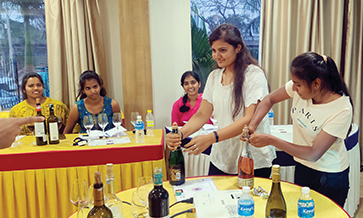The inimitable Sonal Holland, MW, gives you a peek into her seminal professional life story, ‘One In A Billion: Becoming India’s First Master of Wine’, published recently by Westland Books. Excerpted here with permission. It is available on amazon.in, crossword.in and sapnaonline.com and frontlist.in.
The process of wine tasting allows a taster to appreciate different aspects of wine, and then decide on its style, personality and in what context such a wine would thrive. For example, is this a wine most suitable to be sold in a supermarket at an affordable price? Or, would it be worthy of listing at a fine-dining establishment?
But the most important thing to remember is that your conclusion must always be constructive and objective, never pejorative of the wine. Even a $2 wine that sells tens of million cases each year is as commercially important as a super-premium collector’s wine that has the ability to age for 30 years and is sought-after for its brand status.
The beauty of blind tasting is that it takes away all prejudices and allows you to assess the wine independent of all bias. In a blind tasting, you are told nothing about the wine, including its grape variety, region, producer or price. So, tasting wines blind allows for an objective evaluation based on sensory perception, rather than relying on pre-conceived notions about the wine’s label, price or origin.
If there was ever any truth to the adage ‘the proof is in the pudding’, nowhere does it apply better than when one is tasting wines blind. The proof is indeed in the glass. That’s why they say, in vino veritas (in wine, there is truth)!
Guilt pangs
Since there was a lack of mentorship and the availability of many varieties of wines in India, every opportunity to learn came at a heavy cost to me, both financially and personally.
There were days when I would cuddle my daughter Rianna while she slept; then sneak out in the dead of night to catch a flight. Sitting in my car, with tranquil streets passing by and barely a soul in sight, I would battle with an existential crisis. What are you doing with your life, Sonal? Will anything good ever come out of all the labour you are putting in? What if the reward is not worth the pain? What if you are not even rewarded with the title in the end? What will you do with yourself then?
The world around me kept changing ever so gently with each car ride, but that feeling of restlessness was a constant companion, as was a deep longing for normalcy.
I craved the smallest of pleasures of ordinary life: sleeping next to my child, having Sunday brunch with my family, catching a movie with friends on a Friday evening, visiting my parents and eating dal-chawal made by Mom, or staying in bed the whole day and binge-watching a sitcom for the nth time.
I often felt tremendous guilt for not being there for my daughter, parents and husband when they needed me. I wasn’t there to hold their hand when they fell sick. I wasn’t there to take my parents to meet a grieving relative. I wasn’t there to comfort Andrew when he had a bad day at work.
Yes, achievers have no choice but to be self-centred, but it does cause pangs of shame and guilt.
Unique opportunities
Eventually, I realised I had to trick myself into loving the process instead of just focusing on success. My obsession with the goal was making me miserable. I needed to enjoy the unique opportunities I was getting to visit wonderful vineyards, talk to winemakers, see the world, make new friends and listen to wonderful stories.
How many people get the chance to enjoy a glass of wine at a tapas bar while exchanging a few laughs with strangers? Or spend a day under the sun at a scenic vineyard in Italy and soak in the wonders of the European summer? These were memories for a lifetime and were worth savouring, despite being part of a challenging journey.
This realisation dawned on me when I spent one of my birthdays on a train in France, headed from Lyon to Burgundy. I was travelling with a group of fellow MW aspirants who had found out it was my birthday and organised an impromptu celebration.
Someone in the group had arranged for a bottle of Crémant de Bourgogne, a sparkling wine made in Burgundy. Another acquaintance had scored tiny plastic cups. I popped the bubbly, and the group toasted me as we drank the wine from those crinkly cups.
I had been missing my family terribly since the morning, but the group’s gesture cheered me up. I told myself that while I could have been anywhere that day, the reality was that I was on this train, with people who understood my struggles, drinking a delicious wine.
Discovering craft
Moments like these also transformed my relationship with wine. People often ask me when I fell in love with wine. This was not a case of love at first sight. Even when I was sure I wanted to pursue a career in wine and attain the highest qualification in the field, I wasn’t head-over-heels in love with the beverage.
I had grown to admire it deeply and was passionate about wine communication, but to love it with all my heart – that took some time. I cannot point to a single moment when the love for wine crystallised in my heart, but it’s a cumulation of the experiences I had in this journey.
I remember my visit to the Royal Tokaj winery in Hungary, known for its nobly sweet wines, which are considered some of the best wines in the world, often commanding a super-premium price. The IMW had organised this visit for MW candidates to help broaden the students’ perspective of wine, and it certainly broadened mine.
Hungary has a long history of producing wines famous for their unique sweetness, which comes from a special process called ‘noble rot’. This natural phenomenon happens when grapes are left on the vine longer, allowing the fungus botrytis cinerea (noble rot) to develop on the fruits.
This infestation causes the grapes to shrivel, thus increasing the concentration of sugar in them. These mould-infected grapes, also known as Aszú berries, are then hand-picked and used to produce a delectable sweet yet refreshing wine with rich, honeyed flavours and an incredible depth that makes it stand out.
What makes Tokaji wines truly special is their balance of sweetness and acidity. The yields are quite low, so the grapes from one plant can only produce a quarter bottle of wine. Producing Tokaji wines is a labour-intensive process that demands precision, which is passed down from one generation to the next.
Love strikes!
Tasting those sweet wines after seeing how they were produced, I started to appreciate the precision and hard work winemakers put into their craft. I couldn’t help but marvel at how a single fruit like grape can create so many styles and varieties of a beverage with such diverse aromas and flavours, something no other fruit or grain can do.
Wine can have aromas of fresh fruits like strawberries, bananas, pears, blackcurrants, lemons or mangoes, or of spices like star anise and cinnamon, or earthy smells of mushroom and leather from ageing. The wine smells of everything but grapes!
I remember one winemaker in Italy mentioned to me that the alcohol content in wine doesn’t just cause intoxication – it plays a part in giving each wine a unique personality and a bouquet of aromas. Wine is nothing but fermented grape juice in its purest form. Winemakers do not add any additional flavouring substances or chemicals.
Of course, many decisions are taken by the winemaker during this journey to add more stylistic variations in the wine, to give it more clarity, or to make it more stable. But at the end of the day, there is a reason why wine is called the most natural alcoholic drink; this is because winemakers do not add or remove anything from it.














